Priyanka’s message to voters: My husband is being harassed because I have entered politics
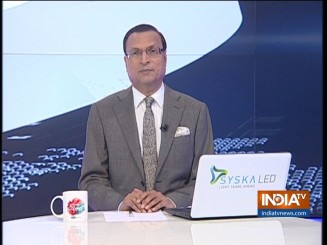 Newly appointed Congress general secretary Priyanka Gandhi Vadra began her political innings on Monday with a debut roadshow in Lucknow, accompanied by her brother and party chief Rahul Gandhi. The same day she opened her first official Twitter account to connect with her followers on social media.
Newly appointed Congress general secretary Priyanka Gandhi Vadra began her political innings on Monday with a debut roadshow in Lucknow, accompanied by her brother and party chief Rahul Gandhi. The same day she opened her first official Twitter account to connect with her followers on social media.
The roadshow did enthuse thousands of party workers in Uttar Pradesh, who appeared jubilant with the entry of Priyanka in active politics. Questions are not being raised about the political benefits that may or may not accrue to the Congress party. There is no doubt that crowds will surge at Priyanka’s roadshows and party rallies, but the problem lies in converting this enthusiasm and eagerness into votes because of the simple reason that the Congress party lacks a well-oiled machinery in Uttar Pradesh down to the booth level.
It is because of this realization that party chief Rahul Gandhi said on Monday that he was aiming at a major victory in the UP assembly elections three years from now. As far as electoral losses are concerned, Priyanka’s entry may dent the prospects of Samajwadi Party-BSP ‘mahagathbandhan’.
There are some leaders in Congress who are saying openly that Priyanka’s entry is not to shore up the party prospects in the general elections, but to protect her husband Robert Vadra, who is facing relentless questioning from Enforcement Directorate in Delhi and Jaipur. These leaders say that if Robert Vadra is arrested, Congress party will go to town to allege that PM Narendra Modi has become afraid after Priyanka’s entry and that it was a political revenge.
Here we have to note one particular point. The questioning by ED in Jaipur is being made on the orders of Rajasthan High Court, and Priyanka is throwing the political dice through gestures loaded with political meanings.
On the first day when she took over as party general secretary at the AICC office, she first accompanied her husband to the ED office, and then drove to the party office. In Lucknow, on Monday, after completing her roadshow, she left for Jaipur, to be with her mother-in-law and husband, facing questioning by the ED. No doubt, Priyanka will not make any comment in public, but her gestures do convey a message to the people. The message is: now that I have entered politics, my husband is being harassed.
Click Here to Watch Full Video | Get connected on Twitter, Instagram & Facebook
Why Sitharaman said, the more Rahul raises Rafale deal issue, the more people will support Modi
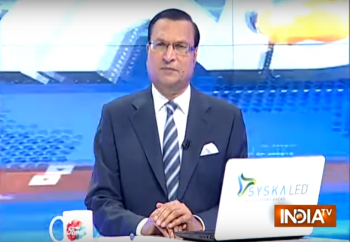 On Friday, the Defence Minister Nirmala Sitharaman in an exclusive interview on my show ‘Aaj Ki Baat’, clearly said that the more Congress President Rahul Gandhi levels baseless and false charges on Rafale deal, the more common people will support Prime Minister Narendra Modi in the forthcoming general elections.
On Friday, the Defence Minister Nirmala Sitharaman in an exclusive interview on my show ‘Aaj Ki Baat’, clearly said that the more Congress President Rahul Gandhi levels baseless and false charges on Rafale deal, the more common people will support Prime Minister Narendra Modi in the forthcoming general elections.
The reasons are simple: Modi himself replied to all charges on Rafale deal in Lok Sabha, Defence Minister Sitharaman herself gave out a detailed reply in Parliament, Finance Minister Arun Jaitley wrote several blogs describing the manner in which Rafale deal was finalized, the Supreme Court in its verdict clearly said there were no irregularities in the selection and pricing process, the apex court even went to the extent of questioning senior Indian Air Force officers who were part of the negotiating team, but Rahul Gandhi is harping on a single theme: that PM Modi gave away Rs 30,000 crore from the deal to industrialist Anil Ambani”s group. Rahul could not come forward with a single piece of concrete evidence nor any witness to corroborate his charges.
Now that the election season is on, the rounds of accusations will multiply.
I will now turn to a Defence Ministry file noting dated 24th November, 2015 in which the then Defence Secretary had objected to the Prime Minister’s Office carrying out “parallel negotiation” on Rafale deal, and had written that this had “weakened the negotiating position of the MOD and Indian negotiating team”.
The page from the file notings, was published incomplete by a newspaper on Friday morning, and immediately Rahul Gandhi called the media to show the noting page. It was left to the Defence Ministry to show the complete page from the notings file, in which the then Defence Minister Manohar Parrikar had clearly responded to his Defence Secretary saying that ” it appears that the PMO and the French President Office are monitoring the progress ..which was an outcome of the summit meeting . Para 5 (in which the objection was raised) appears to be an over reaction. Defence Secretary may resolve the matter in consultation with the Principal Secretary to the PM.”
It would be advisable for Rahul Gandhi to be careful before jumping to conclusions on the basis of an incomplete noting page. He should also refrain from dragging Indian Air Force officers into the debate by addressing them directly to say that money meant for their safety was being given away to industrialists. This will cause incalculable harm to the discipline and integrity of our valiant Armed Forces officers.
Click Here to Watch Full Video | Get connected on Twitter, Instagram & Facebook
How PM Modi hit out at opposition while giving his report card in Lok Sabha
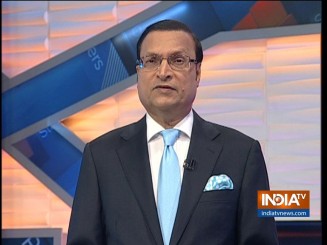 Prime Minister Narendra Modi, while giving a detailed report on what his government has done in the past 55 months, replied to each of the major charges levelled by opposition parties on the issues of unemployment, farm distress and Rafale deal. In a 110-minute reply in Lok Sabha, Modi compared 55 months of his governance with 55 years of governance by Congress, and gave a comparative assessment.
Prime Minister Narendra Modi, while giving a detailed report on what his government has done in the past 55 months, replied to each of the major charges levelled by opposition parties on the issues of unemployment, farm distress and Rafale deal. In a 110-minute reply in Lok Sabha, Modi compared 55 months of his governance with 55 years of governance by Congress, and gave a comparative assessment.
Modi’s speech appeared to be part of the agenda that he is going to set for his nationwide whirlwind election campaign that begins today from Chhattisgarh. In his comparative study of 55 years of Congress rule with 55 months of NDA governance, Modi cited facts and figures relating to railways, highways, employment, farmers’ welfare, Mudra bank loans, cleanliness driver, electrification, LPG connections, etc.
Modi vowed to continue his government’s strong drive against corruption. He narrated how nearly 3 lakh ‘benami’ companies were detected and shut down, and ‘benami’ properties acquired through ill-gotten wealth were being seized. Towards the end of his speech, a determined Modi said emphatically that the corrupt and the looters will fear him as he would spare none.
Replying to the opposition’s allegation that his government had weakened institutions like the CBI, judiciary, Election Commission and the army, Modi hit back asking who had denigrated the army by planting baseless reports of a non-existent coup attempt. He also asked who had publicly tore up a Cabinet resolution of his own party’s government.
Modi asked who had sought to weaken the EC by questioning the electronic voting machines. He also asked which party had orchestrated a move to unseat the then Chief Justice of India through a notice of impeachment motion in Rajya Sabha. He also asked which party leader had described the army chief as a street goon (sadak ka gunda).
Modi also replied to the opposition charge that his government allowed looters of public money like Vijay Mallya, Nirav Modi and Mehul Choksi to flee India. He said, his government has already taken measures to extradite these economic fugitives and has begun seizing their properties. He also pointed out how nearly 20,000 NGOs who were getting unaccounted money from foreign shores had to wind up because of his government’s tough policy measures.
The PM described the Mahagathbandhan (grand alliance) of opposition parties as Maha Milavat (grand adulteration), a combination of disparate political parties whose leaders have diverse views on major policy issues and most of them nurse ambitions to become the PM.
No doubt, the BJP cadre is going to start its Lok Sabha election campaign with gusto by using the Prime Minister’s no-holds-barred speech. The aim is to ensure that Modi’s message reaches each and every household before the crucial elections.
Click Here to Watch Full Video | Get connected on Twitter, Instagram & Facebook
Political fallout of ED’s money laundering case against Vadra and Priyanka taking charge
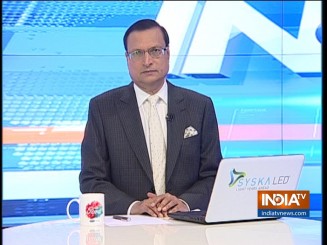 The Enforcement Directorate officials on Wednesday questioned Robert Vadra, husband of Congress general secretary Priyanka Gandhi Vadra in connection with a money laundering case involving a London property purchased from fugitive arms dealer Sanjay Bhandari. The said property at Bryanston Square, London is worth 1.9 million pounds. Vadra has denied any links with the said deal.
The Enforcement Directorate officials on Wednesday questioned Robert Vadra, husband of Congress general secretary Priyanka Gandhi Vadra in connection with a money laundering case involving a London property purchased from fugitive arms dealer Sanjay Bhandari. The said property at Bryanston Square, London is worth 1.9 million pounds. Vadra has denied any links with the said deal.
There are several cases of economic offence pending against Vadra. One relates to the purchase and sale of land plots in Rajasthan during the tenure of then CM Ashok Gehlot. Vadra has to appear at the ED Jaipur office for questioning too. Similar controversial land deals in Haryana by Vadra’s firm have resulted in filing of FIR in which the then CM Bhupinder Singh Hooda has been made accused.
ED officials claim they have solid evidences in the money laundering case relating to the London property. Since the ED appears to have an airtight case, Vadra has taken interim bail and protection from arrest till February 16, and he duly appeared before ED on Wednesday.
Since the cases will have a political fallout on the future of Priyanka Gandhi and party chief Rahul Gandhi, Priyanka accompanied her husband to drop him at the ED office and then proceeded to the AICC office to take over as party general secretary. While doing so, Priyanka said, “He is my husband. He is my family. I support my family. Everyone knows why this is being done.”
It is now up to the ED and law courts to decide whether Vadra is guilty or not, but Priyanka is nonchalant. On Wednesday, she discussed with party leaders about the political situation in eastern UP, and plans to visit the region soon.
A survey by India TV-CNX in 43 Lok Sabha constituencies of UP, after Priyana’s entry into politics has showed that the Congress party may gain in vote share, but conversely it will result in loss to the SP-BSP Mahagathbandhan and gain to NDA. The jury is still out.
Click Here to Watch Full Video | Get connected on Twitter, Instagram & Facebook
Mamata should not throttle democracy by denying permissions for BJP’s public meetings
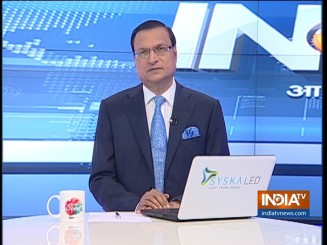 West Bengal chief minister Mamata Banerjee’s government refused permission to UP chief minister Yogi Adityanath’s helicopter to land in Bankura on Tuesday, and the BJP rally had to be cancelled. Yogi however managed to land his chopper in Barmasia near Bokaro in neighbouring Jharkhand, and travelled nearly 30 km by road to address a huge gathering in Purulia. Two more senior BJP leaders Shivraj Singh Chouhan and Shahnawwaz Hussain were denied permission to hold rallies in Murshidabad district. Similarly, on Sunday, Yogi’s chopper was denied permission to land in Balurghat, North Bengal, and he had to address the gathering via phone.
West Bengal chief minister Mamata Banerjee’s government refused permission to UP chief minister Yogi Adityanath’s helicopter to land in Bankura on Tuesday, and the BJP rally had to be cancelled. Yogi however managed to land his chopper in Barmasia near Bokaro in neighbouring Jharkhand, and travelled nearly 30 km by road to address a huge gathering in Purulia. Two more senior BJP leaders Shivraj Singh Chouhan and Shahnawwaz Hussain were denied permission to hold rallies in Murshidabad district. Similarly, on Sunday, Yogi’s chopper was denied permission to land in Balurghat, North Bengal, and he had to address the gathering via phone.
Denying permission to hold public meetings amounts to throttling the democratic aspirations of the people, that too, by a leader who is herself crying hoarse over “Save Democracy” slogan.
I would again like to remind Mamata Banerjee of the days when the then ruling Left Front used to prevent her from addressing gatherings, and their goons used to beat up Trinamool Congress supporters. Mamata had to struggle for more than a decade against Left Front rule in the face of bomb attacks, stoning and arson carried out by Left Front cadres.
It surprises me when I find the same leader imposing blanket restrictions on landing of helicopters and holding of public meetings by the BJP. This does not augur well for democracy. Every political party has the right to hold public meetings, and Mamata Banerjee must know that she would herself campaign using chopper during the Lok Sabha poll in BJP-ruled states. What would happen if the BJP decides to repay her back with the same coin?
It is true that Mamata Banerjee’s Trinamool Congress is facing a strong political challenge from the BJP in West Bengal, but as a seasoned political leader, she should know how to tackle such a challenge politically. This challenge cannot be met through administrative orders denying permission in order to throttle democracy.
Click Here to Watch Full Video | Get connected on Twitter, Instagram & Facebook
‘Save Democracy’ call cannot be a one-way route, Mamata must walk the talk in Bengal
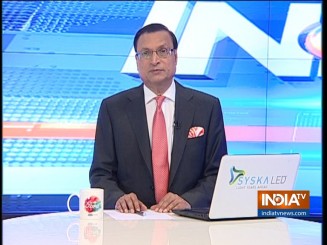 The Supreme Court on Tuesday directed the Kolkata Police Commissioner Rajeev Kumar to make himself available for questioning by CBI in faraway Shillong instead of Kolkata, and “faithfully” cooperate in the central agency’s probe into the Saradha chit fund scam. The apex court also directed the CBI that no “coercive steps” including the arrest of the Commissioner must be taken in course of the investigation. The Supreme Court has also sought replies from Rajeev Kumar on CBI’s allegations that he was tampering with electronic evidence and providing the agency with doctored materials.
The Supreme Court on Tuesday directed the Kolkata Police Commissioner Rajeev Kumar to make himself available for questioning by CBI in faraway Shillong instead of Kolkata, and “faithfully” cooperate in the central agency’s probe into the Saradha chit fund scam. The apex court also directed the CBI that no “coercive steps” including the arrest of the Commissioner must be taken in course of the investigation. The Supreme Court has also sought replies from Rajeev Kumar on CBI’s allegations that he was tampering with electronic evidence and providing the agency with doctored materials.
The CBI officers had gone to the official residence of Kolkata Police Commissioner on Sunday evening to question him on the scam because it was he who headed the Special Investigation Team set up by Mamata Banerjee’s government. Rajeev Kumar was given notices four times by the CBI to be available for questioning, but the Commissioner not only evaded these notices, but refused to reply to them.
Naturally, questions arise as to why the West Bengal Chief Minister Mamata Banerjee took the unprecedented step of going to her Police Commissioner’s residence, prevented him from being questioned by CBI and pitched up a tent in Kolkata to stage an impromptu dharna. The main question that is being asked is what is she trying to hide?
Let me make it clear here. The Saradha chit fund scam probe began during the UPA rule. Lakhs of people lost their hard-earned savings in this scam. It is the Supreme Court which is supervising the CBI probe into the scam. The CBI team had not gone to arrest any Trinamool Congress leader on Sunday evening. The team only wanted to question the Police Commissioner, who had headed the SIT.
Mamata Banerjee sat on her dharna, with IPS and state police officers sitting with her, along with her party leaders. She called up almost all the Opposition leaders across India seeking their support. Some of the leaders reached the dharna site, but most of the other leaders preferred to offer verbal support only.
The West Bengal CM is raising the slogan of ‘Save Democracy’, but on ground, democracy is in peril in her own state because of her governmental machinery.
BJP is not being given permission to organize rallies for BJP President Amit Shah, UP chief minister Yogi Adityanath and Shahnawaz Husain. Choppers of Amit Shah and Yogi Adityanath are not being given permission to land in West Bengal. There were murderous attacks, ransacking of BJP offices and bomb blasts during the panchayat elections last year. Candidates of opposition parties were physically prevented from taking part in elections. BJP candidates who won the panchayat elections are hiding in neighbouring Jharkhand state out of fear of being attacked by TMC cadres.
In such circumstances, if Mamata Banerjee is giving a call to ‘Save Democracy’, she should know that it cannot be a one way route. And I also let me remind her one thing from the past: She came to power after fighting tooth and nail for democratic rights and freedom in West Bengal. She faced curbs and tyranny of the Left Front government. She has a right to protest but she should allow others also their democratic rights to communicate with the public.
Click Here to Watch Full Video | Get connected on Twitter, Instagram & Facebook
Modi’s interim budget could become a game changer for LS polls
 Prime Minister Narendra Modi’s pre-election interim budget placed in Parliament on Friday could become a big game changer during the forthcoming Lok Sabha elections due in April-May. He has given relief to 12 crore small and marginal farmers, 3 crore middle class income tax payers, 30 crore workers in unorganized sector and small businessmen.
Prime Minister Narendra Modi’s pre-election interim budget placed in Parliament on Friday could become a big game changer during the forthcoming Lok Sabha elections due in April-May. He has given relief to 12 crore small and marginal farmers, 3 crore middle class income tax payers, 30 crore workers in unorganized sector and small businessmen.
It was impossible not to notice Congress President Rahul Gandhi sitting glum, holding his chin inside the Lok Sabha as Finance Minister Piyush Goyal read out his budget speech to huge applause from members. The opposition benches were silent as ruling party MPs chanted ‘Modi, Modi’ slogans normally heard at the PM’s rallies.
It was an interim budget only on paper, because Goyal was reading out Modi government’s economic road map for the next 10 years.
The first major sop was to the middle class income tax payer with taxable income upto Rs 5 lakh a year. They will not have to pay tax. The second major sop was to small and marginal farmers having upto 5 acres of land. They will be paid Rs 6000 per annum in three instalments directly to their bank accounts, to be implemented with effect from December last year.
The third major sop was to millions of workers in unorganized sector, who will be getting Rs 3000 monthly pension on attaining the age of 60. The fourth major sop was exemption of TDS on interest from fixed deposits raised from Rs 10,000 to Rs 40,000. Moreover, Rs 1,70,000 crore was earmarked for national food security and Rs 60,000 cr for MNREGA (national rural employment guarantee).
The Rs 6000 per annum payment to small and marginal farmers will be completely funded by the Centre. The farmer community was said to be unhappy with Modi government in recent years, and one reason for the poor poll performance in Madhya Pradesh, Rajasthan and Chhattisgarh was attributed to agrarian unrest. This major sop to small and marginal farmers is expected to douse farmers’ anger to a large extent. The first instalment of Rs 2000 to these farmers will be reaching their bank accounts before March 31, according to Goyal.
Similarly, the middle class was said to be unhappy with Modi government in recent years, particularly since demonetization and GST. With the announcement of ‘no income tax’ for those earning upto Rs 5 lakh a year, it will definitely come as a big relief. Workers in the unorganized sector were mostly ignored by previous governments, and the launching of Rs 3000 monthly pension for them will come as a relief to this section.
If we analyze the manner in which Modi government has handled the economy in the last five years, we can say that on a bigger level, corruption has been eliminated to a large extent in business, officials’ discretion in handing out licences, contracts and routine permissions has been curbed significantly, and at the lower level, leakage in government schemes has been plugged substantially through direct bank transfer. Inflation has been kept under control in the last four and a half years.
Questions were raised regarding slowdown of economy due to demonetization and GST, but even international economists admit that the Indian economy is now the fastest growing economy in the world. Rail, road and aviation infrastructure have got a big fillip.
The only question that remains to be answered is why Modi government failed to create jobs for millions of unemployed youths. The jury is still out on this issue. But if one looks at the overall picture, the banking sector has been strengthened, Mudra loans are being given to small entrepreneurs, new businesses are being set up, the infrastructure sector has become strong, big time corruption has been more or less eliminated. These, in a nutshell, are the major economic achievements of Modi rule. The credit for laying the foundation of fiscal management that made these pre-election sops possible surely goes to Arun Jaitley, who steered the Finance Ministry for four and a half years, and did much of the spadework for the current interim budget, before he had to leave for the US for surgery. He has recovered and wll return next week.
Why was Surjewala made a scapegoat in Jind byelection?
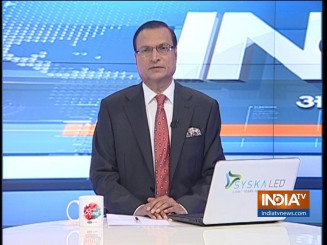 The BJP in Haryana, led by Chief Minister Manohar Lal Khattar, on Thursday got a shot in the arm when the party for the first time in the state’s history won the Jind assembly seat in a three-cornered battle, relegating the Congress candidate Randeep Surjewala to third position.
The BJP in Haryana, led by Chief Minister Manohar Lal Khattar, on Thursday got a shot in the arm when the party for the first time in the state’s history won the Jind assembly seat in a three-cornered battle, relegating the Congress candidate Randeep Surjewala to third position.
Though the results are out, there is a question lurking in the minds of most of the people as to why Surjewala, who was part of the core team of party president Rahul Gandhi, was made the scapegoat by fielding him in an assembly byelection, at a time when there are hardly nine months left for the Haryana assembly elections. Surjewala is already the Congress MLA from Kaithal, and yet he was fielded in Jind bypoll.
Surjewala heads the media department of Congress in Delhi and he has carefully cultivated his image on the national level by forcefully presenting the party’s views on major issues. He is supposed to be close to Rahul and Priyanka Gandhi, and at a crucial time, when the nation is at the crossroads, waiting for the general elections, he was suddenly fielded in a byelection in Haryana.
After his defeat in Jind, the former chief minister of Haryana Bhupinder Singh Hoods reacted by saying that normally ruling party win byelections. The question is: then why was Surjewala fielded in Jind bypoll?
Several Congress leaders attribute this to the internal strife going on in the Haryana unit of the party. They say that the BJP is well entrenched in power, with all the 10 Lok Sabha seats and majority of the seats of the state assembly in its kitty, and Hooda was hardly being noticed at the Centre. On the other hand, the rise of graph in Surjewala’s career was becoming an eyesore for Hooda, who is trying to groom his son Deepender Hooda.
It was Hooda who gave Rahul Gandhi the idea to contest the Jind byelection by fielding a heavyweight like Surjewala, who had a track record of defeating former CM Om Prakash Chautala (now in jail after being convicted in a scam) twice in the past. Surjewala, being a loyal soldier of the party high command, could not refuse and he was thus made a scapegoat. This begs another question: why couldn’t Rahul Gandhi understand the apparent gameplan behind this idea?
Click Here to Watch Full Video | Get connected on Twitter, Instagram & Facebook